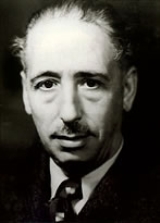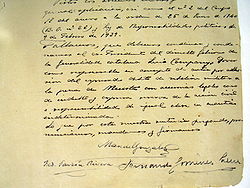
Lluís Companys i Jover
Encyclopedia


Catalonia
Catalonia is an autonomous community in northeastern Spain, with the official status of a "nationality" of Spain. Catalonia comprises four provinces: Barcelona, Girona, Lleida, and Tarragona. Its capital and largest city is Barcelona. Catalonia covers an area of 32,114 km² and has an...
, Spain from 1934 and during the Spanish Civil War
Spanish Civil War
The Spanish Civil WarAlso known as The Crusade among Nationalists, the Fourth Carlist War among Carlists, and The Rebellion or Uprising among Republicans. was a major conflict fought in Spain from 17 July 1936 to 1 April 1939...
.
He was a lawyer and leader of the Republican Left of Catalonia (ERC) political party. Exiled after the war, he was captured and handed over by the Nazi secret police, the Gestapo
Gestapo
The Gestapo was the official secret police of Nazi Germany. Beginning on 20 April 1934, it was under the administration of the SS leader Heinrich Himmler in his position as Chief of German Police...
, to the Spanish dictatorship of Francisco Franco
Francisco Franco
Francisco Franco y Bahamonde was a Spanish general, dictator and head of state of Spain from October 1936 , and de facto regent of the nominally restored Kingdom of Spain from 1947 until his death in November, 1975...
, who had him executed by firing squad in 1940. Companys is the only incumbent president of a region in Europe to have been executed, and seventy one years later the Spanish state
Spanish State
Francoist Spain refers to a period of Spanish history between 1936 and 1975 when Spain was under the authoritarian dictatorship of Francisco Franco....
has not yet annulled the council of war
Council of war
A council of war is a term in military science that describes a meeting held to decide on a course of action, usually in the midst of a battle. Under normal circumstances, decisions are made by a commanding officer, optionally communicated and coordinated by staff officers, and then implemented by...
which sentenced him.
Life
Companys was the son of farmers Josep Companys and Maria Lluïsa de Jover. After getting his law degree from the Universitat de Barcelona, Companys participated in the political life of Catalonia from a young age. In 1906, as a result of the military burning the writings of Catalan newspapers Cu-Cut! and La Veu de Catalunya, and after the passing of the Ley de Jurisdicciones ("Law of Jurisdictions"), which made speech against Spain and its symbols a criminal offence, he participated in the creation of Solidaridad Catalana.Later, he became affiliated to the ephemeral Unió Federal Nacionalista Republicana, of which he was president of the youth section. He was investigated for his intense youth activities and was jailed fifteen times, being classified after the Tragic Week of Barcelona as a "dangerous individual" in police records.
With Francesc Layret
Francesc Layret
Francesc Layret i Foix was a nationalist and republican Catalan politician and lawyer. He was assassinated in 1920 following the mass detention of several of his colleagues and other left-wing politicians and union leaders.Layret was a democrat, republican, Catalan nationalist and defender of...
, Companys represented the left-wing labor faction of the Partit Republicà Català (Catalan Republican Party), for which he was elected councillor of Barcelona in 1916. In November 1920, he was detained together with Salvador Seguí
Salvador Seguí
Salvador Seguí , known as El noi del sucre for his habit of eating the sugar cubes served him with his coffee, was a Catalan anarcho-syndicalist in the Confederación Nacional del Trabajo , a Spanish confederation of anarcho-syndicalist labor unions active in Catalonia.Together with Ángel Pestaña,...
(known as El Noi del Sucre), Martí Barrera, Josep Viadiu, and other trade unionists and was deported to the Castell de la Mola in Mahón
Mahon
Mahón is a municipality and the capital city of the Balearic Island of Minorca , located in the eastern part of the island. Mahon has the second deepest natural harbor in the world: 5 km long and up to 900m. wide...
, on Menorca. Shortly afterward, Layret was assassinated while preparing his defence.
Despite his deportation, in the 1920 legislative elections, Companys was elected deputy of Sabadell
Sabadell
Sabadell is the second largest city in the comarca of the Vallès Occidental in Catalonia, Spain. It is in the south of the comarca, on the River Ripoll, 20 km north-west of Barcelona...
, taking the place of Layret, who was to have taken that seat prior to his assassination. This gave him parliamentary immunity, which secured his release from prison.
Companys was one of the founders of Unió de Rabassaires in 1922, for which he worked as a lawyer and director of the magazine La Terra during the years of the regime of Primo de Rivera
Primo de Rivera
Primo de Rivera is a Spanish family prominent in politics of the 19th and 20th centuries:*Fernando Primo de Rivera, Spanish politician and soldier, 1831-1921*Miguel Primo de Rivera , dictator of Spain from 23 September 1923 to 1930...
.
Detained again, he was unable to attend the Conferencia de Izquierdas (Conference of Leftists) held between March 12 and March 19, 1931, from which was born the ERC political party; however, he was elected as an executive member of that party, representing the Partit Republicà Català. Thanks to the bonds between the Spanish labor movement and the Spanish union movement, the election of Companys to this position gave the ERC great prestige amongst left-wing public opinion, whereas before, it had been considered a party of the small progressive bourgeoisie.
On October 6, 1934, Companys led a Catalan Nationalist uprising against the center and right-wing republican government, and proclaimed the Catalan State (Estat Català), an action for which he was arrested and sentenced to thirty years in prison. However, after the 1936 election and the victory of the left-wing coalition Frente Popular, he was set free by the new government.
When the Spanish Civil War
Spanish Civil War
The Spanish Civil WarAlso known as The Crusade among Nationalists, the Fourth Carlist War among Carlists, and The Rebellion or Uprising among Republicans. was a major conflict fought in Spain from 17 July 1936 to 1 April 1939...
began shortly after, in July 1936, Companys sided with the Second Spanish Republic
Second Spanish Republic
The Second Spanish Republic was the government of Spain between April 14 1931, and its destruction by a military rebellion, led by General Francisco Franco....
against the Nacionales rebels and was instrumental in organizing a collaboration between the Central Committee of Anti-Fascist Militias, which was sponsored by his Catalan
Catalan nationalism
Catalan nationalism or Catalanism , is a political movement advocating for either further political autonomy or full independence of Catalonia....
government, and the Workers' Party of Marxist Unification (POUM
Poum
Poum is a commune in the North Province of New Caledonia, an overseas territory of France in the Pacific Ocean. The town of Poum is located in the far northwest, located on the southern part of Banare Bay, with Mouac Island just offshore....
), a revolutionary anti-Stalinist
Anti-Stalinist left
The anti-Stalinist left is an element of left-wing politics that is critical of Joseph Stalin's policies and the political system that developed in the Soviet Union under his rule...
communist party, and Confederación Nacional del Trabajo
Confederación Nacional del Trabajo
The Confederación Nacional del Trabajo is a Spanish confederation of anarcho-syndicalist labor unions affiliated with the International Workers Association . When working with the latter group it is also known as CNT-AIT...
(CNT), an anarchist syndicalist trade union.
During the war, Companys attempted to maintain the unity of his political coalition, but after the Soviet Union consul, Vladimir Antonov-Ovseenko
Vladimir Antonov-Ovseenko
Vladimir Alexandrovich Antonov-Ovseyenko , real surname Ovseyenko, party aliases the 'Bayonet' and 'Nikita' , a literary pseudonym A. Gal , was a prominent Soviet Bolshevik leader and diplomat. He was born in Chernigov into an officer's family.In 1903, Antonov-Ovseyenko joined the Menshevik party...
, threatened that his country would cut off aid to Catalonia, he sacked Andrés Nin
Andrés Nin
Andreu Nin i Pérez was a Spanish Communist revolutionary.- Early life :...
from his post as minister of Justice in December 1936.
Exiled to France in 1939 after the Civil War, he was arrested and extradited by Nazi German
Nazi Germany
Nazi Germany , also known as the Third Reich , but officially called German Reich from 1933 to 1943 and Greater German Reich from 26 June 1943 onward, is the name commonly used to refer to the state of Germany from 1933 to 1945, when it was a totalitarian dictatorship ruled by...
authorities to the Spanish government in September 1940. Companys was executed, after a military trial lacking legal guarantees, at Montjuïc
Montjuïc
Montjuïc is a hill located in Barcelona, Catalonia.-Etymology:Montjuïc is translated as 'Jew Hill' in medieval Catalan, or is perhaps related to the Latin phrase Mons Jovicus . The name is found in several locations in the Catalan Countries: the Catalan cities of Girona and Barcelona both have a...
Castle on October 14, 1940. He is buried at the Montjuïc Cemetery, near the castle.
The main stadium
Estadi Olímpic Lluís Companys
Estadi Olímpic Lluís Companys is a stadium in Barcelona, Catalonia, Spain. Originally built in 1927 for the 1929 International Exposition in the city , it was renovated in 1989 to be the main stadium for the 1992 Summer Olympics...
used for the 1992 Summer Olympics
1992 Summer Olympics
The 1992 Summer Olympic Games, officially known as the Games of the XXV Olympiad, were an international multi-sport event celebrated in Barcelona, Catalonia, Spain, in 1992. The International Olympic Committee voted in 1986 to separate the Summer and Winter Games, which had been held in the same...
, located on Montjuïc, is officially named in his memory. In 1998 a monument to Companys was installed near Arc de Triomf
Arc de Triomf
The Arc de Triomf is an archway structure in Barcelona, Spain. It was built for the Exposición Universal de Barcelona , as its main access gate by architect Josep Vilaseca i Casanovas.The arch is built in reddish brickwork in the Neo-Mudéjar style...
, on Passeig de Lluís Companys in Barcelona. A friend of Companys, Conxita Julià
Conxita Julià
Conxita Julià , is a Catalan poetess and excursionist. She exchanged letters with Lluís Companys i Jover, president of the Generalitat de Catalunya in the years 1934-1940, and her figure appears in a sculpture honouring Companys inaugurated in 1997 ....
, is portrayed next to Companys' image in the monument.
See also
- Catalan RepublicCatalan RepublicThe Catalan Republic also known as the Catalan State, is an unrecognized state claimed by the Catalan independentism or nationalism. The Catalan Republic has been proclaimed at least four times:* In 1641, by Pau Claris....
- Passeig de Lluís Companys in Barcelona
- List of people executed by Francoist Spain

